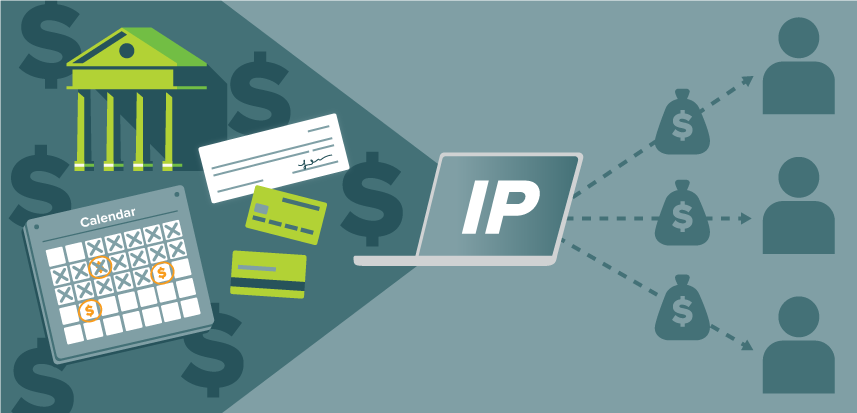As finance teams automate and digitize their accounts payable (AP) processes, many are still held back by the inefficiencies of traditional payables models. With traditional payment models, organizations manage multiple workflows for making B2B payments, with each payment method—such as checks, ACH payments, and wires—requiring a different control mechanism. It’s a manual, expensive, and risky approach that often results in a poor user experience for AP teams and a frustrating AR experience for vendors.
Today, many businesses are turning to an integrated payables solution as a more modern, streamlined alternative. Integrated payables consolidate all payment types into a single, automated workflow that delivers a consistent, controlled payment approval experience for AP teams while allowing vendors to receive payments via their preferred methods. This helps organizations reduce costs, improve efficiency, and mitigate risks across the payment process.
A critical component of integrated payables is the ability to leverage electronic payment methods, such as ACH and virtual cards, to reduce the risk, as well as the labor and fees associated with manual, physical checks. This allows AP teams to pay vendors faster, more securely, and in alignment with many vendors’ AR preferences. According to research, approximately 79% of vendors prefer electronic payments over paper checks.
This blog explores the benefits of integrated payables and shares how MineralTree customers are leveraging this solution to improve their accounts payable processes, gain control over cash flow, and build stronger vendor relationships.
Key takeaways
- Implementing integrated payables can help businesses streamline operations so teams can focus on strategic activities that drive business growth.
- Using virtual cards and ACH payments within integrated payables systems can significantly reduce costs and help businesses earn rebates.
- Integrated payables increase security, reduce fraud risk, and improve vendor relationships by offering preferred and more secure payment methods.
Overview of traditional payables challenges
Managing traditional B2B payments comes with obstacles that slow down operations and increase risk. From the inefficiency of manual processes and the high costs associated with labor-intensive tasks to the delays in vendor payments and increased fraud risks, these outdated methods hold businesses back. Let’s take a look at the top challenges businesses face with traditional payables workflows.
Manual processes
With traditional B2B payments, each payment type or ‘rail’ (check, ACH, card, wire, etc.) requires its own workflows, controls, and separate integrations with your ERP system, resulting in multiple, disparate workflows for making payments.
Additionally, the control mechanisms differ for payment methods: checks need to be signed and mailed, ACH payments need to be initiated via account owners, and wires may require phone authorization. These manual processes are at odds with the fast-paced, highly digitized world in which businesses operate today.
Slow vendor payments
Further, the data that’s available to you and your vendors varies by type. While all rails can move money from point A to point B, the true value lies in the level of data, security, and visibility available to the customer.
High processing costs
Traditional B2B payments are expensive in terms of labor. Your team’s time and effort spent printing and stuffing checks, calling or chasing down vendor payment authorization, and the supplies needed (paper and postage associated with manual checks) are inefficient and costly.
Fraud risks
Multiple integration points, controls, and data disparities found in traditional B2B payments make organizations susceptible to fraud risks. Manual processes are slow, error-prone, and lack transparency, creating more opportunities for fraudulent activity.
There’s also less control over who has access to your financial data with manual processes, which can lead to security issues and potential fraud. When integrating multiple rails into your ERP systems and workflows, you open up additional entry points to your data that could create security gaps.
What is integrated payables?
Integrated payables consolidates all your payment types—including virtual card, ACH, and checks–into a single, automated workflow. It delivers a consistent, controlled payment approval experience for your staff, saving you time and money, while providing vendors with payments via their preferred method.
The goal of integrated payables is to improve operational efficiency. Businesses can optimize their cash flow by timing payments effectively and taking advantage of early payment discounts. Integrated payables can also improve vendor relationships through timely payments. This overall approach provides more visibility into financial operations, resulting in more informed decision-making.
Did you know? MineralTree’s integrated payables feature SilverPay, a virtual card option that provides the fastest payments to vendors, in addition to ACH and check. With MineralTree’s integrated payables, you can:
- Improve vendor relationships: About 79% of vendors prefer electronic payments over paper checks.
- Reduce costs and earn rebates: Transitioning to virtual payments can eliminate the labor and fees associated with checks and even earn you rebates.
- Enhance security and lower the risk of fraud: Only 3% of businesses report fraud attempts via virtual card, compared with 66% for checks and 37% for ACH.
What is an integrated payables system?
An integrated payables system is a comprehensive solution designed to automate and improve AP processes. Unlike traditional methods, which often involve fragmented systems and manual tasks, an integrated payables system combines all AP activities into a single, centralized platform.
Integrated payables systems have several key features, including:
- Automated invoice capture and approval workflows
- Payment processing that accommodates various payment types, including virtual card, ACH, and checks
- Up-to-the-minute reporting and analytics
There are many benefits of implementing an integrated payables system, such as:
- Increased efficiency from reduced manual tasks
- Significant cost savings from optimized payment processes
- Improved accuracy due to automation
How do integrated payables work?

Integrated payables is conducted via one secure online payments solution that facilitates payment processing and management, resulting in increased cost savings, improved visibility and control, and accelerated business growth. Integrated payables solutions integrate directly with your accounting system. Once invoices have been approved for payment, IP solutions will retrieve the payments information from your ERP system, collect money from you to facilitate payments, and disburse payments accordingly on your behalf. This allows customers to execute payables via a single payments workflow and make timely and accurate payments, providing organizations with consistent data reconciliation and control mechanisms across all payment types.
What are the advantages of integrated payables?
For any organization, cutting paper checks and manually processing payments wastes time, money, and resources. With integrated payables solutions, companies can completely remove the manual work associated with payment processing. Making and managing payments becomes easier, and organizations realize the following benefits:
1. Reduced cost of payments and streamlined operations
Preparing an individual check costs between $4 and $20, including labor, materials, and postage. With an integrated payables offering, businesses can reduce payment processing costs by up to 80%. IP can optimize the payments mix and affect a low-cost, high-value model. With virtual cards, not only are the transactions free, but organizations earn cash back rebates from making payments, which can offset or even exceed payables costs.
In the process, an integrated payables solution helps organizations save time and free up internal resources. Historically, the AP or finance department spent a significant amount of time printing, signing, stuffing, and mailing paper checks. Electronic payments decrease the time employees spend on manual payments processing or delivery. This results in a faster and more efficient payments process, and as a result finance professionals have more time to focus on higher value activities.
“Step back and look at your existing team, who’s responsible for the disbursement function? How much of their time is going towards that? What issues are they running into? Where have you had challenges? A lot of those are going to be solved with a solution like MineralTree. I would assess your situation and don’t be intimidated with MineralTree because it’s click and play and you’re off and running.”
– Brent Sitarski, CFO, Touchstone
2. Reduced fraud risk
An integrated payables solution reduces the risk of fraud by consolidating payments–such as checks, ACH, cards, and wires–into a single, automated workflow that reviews checks, flags suspicious activity, and protects against ACH debit fraud.
Centralizing payment approvals improves control and oversight, limiting unauthorized transactions and reducing manual touchpoints. Integrated payables also use advanced security features like encryption, multi-factor authentication, and real-time monitoring to protect sensitive payment data. Automating manual processes decreases human error and minimizes vulnerabilities that fraudsters can exploit. With fewer entry points and increased visibility into payment activities, businesses can quickly detect suspicious behavior and respond quickly. This approach reduces the risk of phishing attacks, payment diversion, and other fraudulent activities and creates a safer and more reliable B2B payment process.
3. Improved business relationships
Integrated payables solutions provide users with complete visibility into the status of payments via one single, centralized platform. Providing real-time access to payment information increases transparency, improves business relationships, lessens inquiries and dispute potential, and drives business growth.
4. Increased control over cash flow
By consolidating multiple workflows and control mechanisms into a single, automated workflow, integrated payables brings teams faster processing, finer control over payment timing, and the opportunity to take advantage of early payment discounts and rebates.
Did you know? MineralTree’s integrated payables solution helps businesses take advantage of rebates with SilverPay, MineralTree’s virtual card component. SilverPay is a premier payment option that lets you make faster, convenient payments more securely than traditional methods such as checks. SilverPay earns rebates on each transaction with vendors in the SilverPay network, helping businesses unlock hidden cash in your supplier base.
Some MineralTree customers like Quartzy cover the entire cost of their MineralTree subscription through SilverPay. There are many vendors in the SilverPay network, with more joining on a regular basis. In fact, many vendors are turning to digital payments as part of their AR strategy.
5. Improved payment security
Best-in-class IP solutions include advanced payment security features like two-factor authentication, payment authorization with multiple approval tiers, segregation of duties, payment limits, and more. Advanced IP solutions, like virtual cards, leverage a method called payment tokenization that allows companies to pay for specific transactions without running the risk of account compromise. In fact, virtual cards offer the highest-level of payment security when compared to other electronic payment types. These security features, coupled with the ability to easily review and approve transactions from one single platform, reduce the risk of fraud and improve overall payment security.
6. Better data insights
In an online bill pay model, customers must manually register each bill in their accounting system and then mark it paid even though they’re paying from somewhere else. This process is disjointed, leaves a lot of room for error, and makes it difficult to connect the dots between invoices and payments. Because they initiate payments directly from the accounting system, integrated payables solutions connect the invoice to the payment, ensuring seamless and automatic payment reconciliation.
7. Ensure business continuity
Integrated payable solutions help ensure business continuity, which is especially important for teams working remote or hybrid. AP teams that relied on manual processes and paper checks have seen their AP process break down completely in a remote working environment. Businesses can execute their payments process anytime, anywhere with integrated payables solutions–without the need to go into the office to print and sign checks.
8. Improved vendor relationships
It’s important to pay your vendors how they want to be paid, and traditional payment methods–especially checks–are no longer the preferred method. Integrated payables solutions such as virtual cards allow you to pay vendors quickly and accurately.
Did you know? Unlike many other AP automation providers, MineralTree’s virtual card doesn’t charge a fee to vendors, making it vendor-preferred.
9. Managed vendor enrollment with MineralTree
New vendors are continuously added to MineralTree’s SilverPay network. MineralTree’s in-house payment optimization team helps customers identify their in-network vendors. The payment optimization team can also work with you to determine any additional vendors you’d like to enroll for virtual cards, and will handle the outreach and onboarding associated with bringing them in-network.
How to implement integrated payables with MineralTree: A step-by-step guide
It’s easy to get started with integrated payables. Below are the standard steps in the process:
- A 30-minute call with MineralTree’s in-house payment optimization team will help you evaluate traditional payment methods that could be advantageous to transition to an integrated payment solution. Together, you’ll analyze current spend patterns and identify strategic vendor relationships that would benefit from digital payment methods.
- Once you’ve decided on the right integrated payment options for your business, the MineralTree team will do all the heavy lifting, providing white-glove service in the transparent and collaborative manner.
- If you decide to implement a virtual card program, MineralTree will design a tailored enrollment campaign to maximize your rebates, while respectfully engaging your vendors and taking their preferences into account.
- If you decide to integrate ACH payments with MineralTree, you’ll be onboarded with our payment processor, securely capture your payment account details, and allow you to choose which vendors you wish to pay with ACH within MineralTree.
- If some of your payments need to remain as checks, those will also be integrated into the consolidated workflow and automated to allow for point and click payment authorization and execution.
The payment optimization experts at MineralTree make the transition from paper to electronic easy and painless. This service is included–at no cost–with your MineralTree subscription.
Case study: cCare Addresses Unique Healthcare AP Challenges with MineralTree
California Cancer Associates for Research and Excellence (cCare) is California’s largest full-service oncology and hematology practice. The organization historically relied on traditional payment processes to manage its AP, which meant the team spent up to 6 hours/day manually entering data and chasing email approvals, including time spent printing, signing, and mailing checks twice a week.
After implementing SilverPay, MineralTree’s virtual card option within the integrated payables solution, the cCare team has been to digitize many vendor payments, which has not only saved them time from their former manual workflows, but also allows them to earn cash-back rebates for making virtual card payments, creating a valuable new revenue stream that is reapplied to the business and shows leadership that the MineralTree solution can pay for itself.
“MineralTree helped both AP staff members save 80% of the time we used to spend on our manual process. This has allowed us to spend more time focused on other high-value initiatives we simply couldn’t do before.”
– Ruby Linkins, AP Specialist, cCare
Read the full case study here.
Transform your business with integrated payables from MineralTree
The lowest value activity in a finance function is writing checks. If you want to ditch paper checks and move to e-payments and virtual cards, reduce the cost of making payments, mitigate B2B payments fraud risks, and seamlessly reconcile your accounting system without undergoing a substantial IT project, you need integrated payables.
With solutions like MineralTree, organizations are armed with the tools they need to execute and process payables easily, securely, and efficiently. By automating manual processes, integrated payables provide organizations with a way to manage the payments process without increasing expenses – eliminating wasted internal resources and allowing organizations to focus on driving growth.
MineralTree offers both integrated payables and invoice-to-pay solutions depending on your specific needs. If you’re looking to streamline your payments process and move away from paper checks, consider integrated payables. If you’re also struggling with manual processes to code invoices and chase approvals, invoice-to-pay can streamline the invoice management workflow and automate payments execution. MineralTree also has the broadest coverage in the marketplace, integrating with more than 160 accounting systems. If you’re in need of a payables overhaul, it’s time to automate and optimize your payment processing with integrated payables from MineralTree. Learn more here.

Integrated payables FAQs
Tl;dr? If you’re short on time the frequently asked questions below provide a quick snapshot of what CFOs need to know about integrated payables.
1. What is an example of integrated payables?
An example of integrated payables is a solution that consolidates various payment methods—such as checks, ACH, and virtual cards—into a single automated workflow. This lets AP teams process invoices, approve payments, and manage vendor relationships within one platform.
2. What are some of the challenges with traditional payables processes?
Traditional payables processes face challenges like manual data entry, high processing costs, slow payment cycles, and increased fraud risk. This can lead to delays, errors, and a lack of visibility, making it difficult to manage your cash flow effectively.
3. Why do you need integrated payables?
Integrated payables are key for streamlining the AP process, reducing manual work and improving operational efficiency. Automating payment workflows helps businesses save time, lower costs, and mitigate fraud risks, letting finance teams focus on more strategic activities.
4. How does an integrated payables system improve vendor relationships?
An integrated payables system improves vendor relationships by providing faster and more reliable payment options so businesses can pay vendors through their preferred methods (e.g., ACH or virtual cards). This timely and flexible approach improves vendor satisfaction and fosters stronger relationships, leading to better negotiation opportunities.



